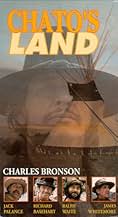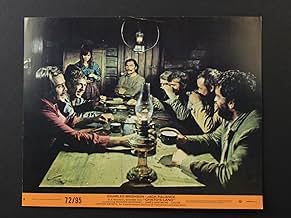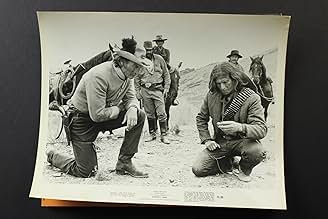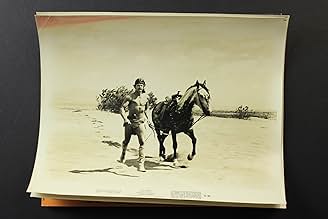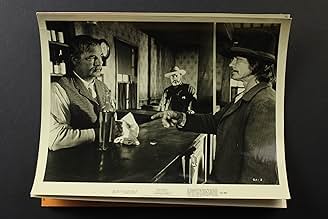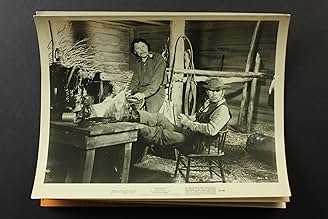PUNTUACIÓN EN IMDb
6,6/10
6,9 mil
TU PUNTUACIÓN
En la década de 1870 en Nuevo México, un mestizo mata a un alguacil intolerante en defensa propia, pero la pandilla que finalmente lo caza se encuentra en territorio peligroso.En la década de 1870 en Nuevo México, un mestizo mata a un alguacil intolerante en defensa propia, pero la pandilla que finalmente lo caza se encuentra en territorio peligroso.En la década de 1870 en Nuevo México, un mestizo mata a un alguacil intolerante en defensa propia, pero la pandilla que finalmente lo caza se encuentra en territorio peligroso.
Reseñas destacadas
Charles Bronson and director Michael Winner made the first of several films together in this western that was shot in Spain. Chato's Land boasts a fine cast of players most of whom don't make it through the end of the film.
Bronson plays Pardon Chato a mixed blood Apache just in town for supplies and a racist U.S. Marshal puts the prod to him. That's a big mistake as Bronson kills him in self defense. A bunch of self righteous citizens get up a posse after him. Their brand of justice includes raping his wife and killing his child in the bargain.
Jack Palance plays the nominal leader of the group, but he's got no control over the meanest of the bunch, a trio of brothers Simon Oakland, Ralph Waite, and Richard Jordan. Others in the party include James Whitmore and Richard Basehart.
Charles Bronson is always a nasty man to cross, never more so when on his own turf as he is in the Arizona desert. Bronson has honed this character to perfection. It's no accident that Winner was the director in the first three Death Wish films. Elements of this same plot are also to be found in a particular favorite Bronson film of mine, Mr. Majestyk.
Chato's Land is a good western with an impeccable cast. I do so love that sudden death ending in this film.
Bronson plays Pardon Chato a mixed blood Apache just in town for supplies and a racist U.S. Marshal puts the prod to him. That's a big mistake as Bronson kills him in self defense. A bunch of self righteous citizens get up a posse after him. Their brand of justice includes raping his wife and killing his child in the bargain.
Jack Palance plays the nominal leader of the group, but he's got no control over the meanest of the bunch, a trio of brothers Simon Oakland, Ralph Waite, and Richard Jordan. Others in the party include James Whitmore and Richard Basehart.
Charles Bronson is always a nasty man to cross, never more so when on his own turf as he is in the Arizona desert. Bronson has honed this character to perfection. It's no accident that Winner was the director in the first three Death Wish films. Elements of this same plot are also to be found in a particular favorite Bronson film of mine, Mr. Majestyk.
Chato's Land is a good western with an impeccable cast. I do so love that sudden death ending in this film.
There's a little in-joke that's included in Pardon Chato's (Charles Bronson) only line spoken in English; and that occurs in about the second minute of this savagely entertaining story about vigilantism running amok somewhere in the Old West.
We see Chato, at the saloon bar, waiting to get his whiskey when in comes the local Marshall Endersby (Jacob Meade), looking to kill himself an uppity mestizo. So, here's the in-joke: just before the Marshall draws to shoot, Chato says: "Back off, lawman!" Then he spins quickly, shooting from the hip to kill the Marshall. It's a joke, because the director, Michael Winner, in 1971, had already filmed a story called Lawman (by the same screen writer, Gerald Wilson) in which a Marshall hunts down a group of men – relentlessly, mercilessly and legally. (Note that Lawman is more highly regarded, at IMDb, than Chato's Land.)
Anyway, the story of Chato is double joke: here, the Marshall is out of the picture (no pun intended) immediately, and the hunters – the Posse Commitatus, a mixed bunch of misfits headed up by either ex-Captain Whitmore (Jack Palance) or Jubal Hooker (Simon Oakland), depending on how the plot unfolds – become the hunted when Chato begins the task of killing them – relentlessly, mercilessly...but, illegally, in this story. Oh, Chato has the moral high ground, many would argue; but, objectively, any court would find him guilty of manslaughter at the very least. And, man, what a slaughter it is! But, this is the Old West, where just about anything goes.
The story has many antecedents (about which Winner and Wilson would have been well aware): The Bravados (1958) with Gregory Peck as the hunter; Hombre (1967) with Paul Newman as the despised mestizo; and Valdez is Coming (1971) with Burt Lancaster as the hunter, and a Mexican to boot. You could probably add to that list. This film adds to it, of course, as being just another take on the good, ol' American pastime of vigilantes racing off to git themselves a hangin' afore nightfall, if possible. In that regard and if you have seen it, you shouldn't miss watching the heartbreak in The Oxbow Incident (1943) with Henry Fonda, heading up an all-star cast, who tries to stop the west's favorite method of dispensing rough justice.
The best part about Chato's Land is the land: the stark, unforgiving country that Chato uses to his advantage. Winner makes good use of long, wide angle shots to emphasize the harsh, bleak landscape; but, his studied close-ups of the characters are often almost works of art. Of the cinematography, I can only complain of the lighting – a good lot of the shoot was completed in pseudo-darkness, using blue filters, no doubt, and was quite annoying at times. Editing is up to par, though, and Jerry Fielding's music is suitably moody – although, I could have done without the military-type snippets.
After speaking that one English line, Chato sticks to Apache, or is silent throughout, as he gets on with his task. So, it's nice to see a man happy in his work, and who doesn't bother us with useless talk.
Highly recommended for all fans of Bronson and Palance.
We see Chato, at the saloon bar, waiting to get his whiskey when in comes the local Marshall Endersby (Jacob Meade), looking to kill himself an uppity mestizo. So, here's the in-joke: just before the Marshall draws to shoot, Chato says: "Back off, lawman!" Then he spins quickly, shooting from the hip to kill the Marshall. It's a joke, because the director, Michael Winner, in 1971, had already filmed a story called Lawman (by the same screen writer, Gerald Wilson) in which a Marshall hunts down a group of men – relentlessly, mercilessly and legally. (Note that Lawman is more highly regarded, at IMDb, than Chato's Land.)
Anyway, the story of Chato is double joke: here, the Marshall is out of the picture (no pun intended) immediately, and the hunters – the Posse Commitatus, a mixed bunch of misfits headed up by either ex-Captain Whitmore (Jack Palance) or Jubal Hooker (Simon Oakland), depending on how the plot unfolds – become the hunted when Chato begins the task of killing them – relentlessly, mercilessly...but, illegally, in this story. Oh, Chato has the moral high ground, many would argue; but, objectively, any court would find him guilty of manslaughter at the very least. And, man, what a slaughter it is! But, this is the Old West, where just about anything goes.
The story has many antecedents (about which Winner and Wilson would have been well aware): The Bravados (1958) with Gregory Peck as the hunter; Hombre (1967) with Paul Newman as the despised mestizo; and Valdez is Coming (1971) with Burt Lancaster as the hunter, and a Mexican to boot. You could probably add to that list. This film adds to it, of course, as being just another take on the good, ol' American pastime of vigilantes racing off to git themselves a hangin' afore nightfall, if possible. In that regard and if you have seen it, you shouldn't miss watching the heartbreak in The Oxbow Incident (1943) with Henry Fonda, heading up an all-star cast, who tries to stop the west's favorite method of dispensing rough justice.
The best part about Chato's Land is the land: the stark, unforgiving country that Chato uses to his advantage. Winner makes good use of long, wide angle shots to emphasize the harsh, bleak landscape; but, his studied close-ups of the characters are often almost works of art. Of the cinematography, I can only complain of the lighting – a good lot of the shoot was completed in pseudo-darkness, using blue filters, no doubt, and was quite annoying at times. Editing is up to par, though, and Jerry Fielding's music is suitably moody – although, I could have done without the military-type snippets.
After speaking that one English line, Chato sticks to Apache, or is silent throughout, as he gets on with his task. So, it's nice to see a man happy in his work, and who doesn't bother us with useless talk.
Highly recommended for all fans of Bronson and Palance.
Released in 1972, "Chato's Land" is typically written off as lame Spaghetti Western with Charles Bronson but, actually, it's a UK production shot in Spain, Mexico and Arizona. And, secondly, there's more depth here than the one-dimensional racist-revenge plot might first lead you to believe.
I'll admit that I was turned off to this movie for years due to Brian Garfield's scathing review in his excellent book "Western Films," where he called it "cheesy, dreary, phony," but an open-minded and honest viewing proves him wrong. Yes, it's dreary, but it's not cheesy or phony. It's true that the desolate Spanish locations are phony, in that it's not the American Southwest, but other than that the characters and dialogue ring true.
The plot is simple: Chato, a half-breed Indian (Charles Bronson), shoots an arrogant, racist lawman in a saloon and a large posse is assembled where they chase Chato in his own element, which is why it's called "Chato's Land."
Bronson's role is taciturn, one-dimensional and almost invisible, until the end where he's a stunning example of masculine strength. Amazingly, Bronson was 50 years-old during filming, but he was in prime physical condition with not an iota of fat. Another reviewer commented that, if he were 6'5", he would've made a perfect Conan the Barbarian.
Bronson's striking presence and solemn performance is key to the success of the movie, of course, but the film's true strength is the writing/directing and the stellar cast that make up the posse, including Jack Palance, Richard Basehart, James Whitmore, Simon Oakland, Ralph Waite, Richard Jordan and more. The group dynamics of the posse and their interplay is where the film shines. Four or five of the men are good men, but they're too blinded by cultural bigotry toward a half-breed to realize the injustice of their cause. It never occurs to them that Chato has rights and that the slain lawman was in the wrong. All they focus on is that a sheriff is dead and a half-breed did it. Most of the rest of the posse are unlikable or repugnant, particularly a character played by Richard Jordan and his father, played by Simon Oakland.
Due to their differences, the loosely put-together posse lacks solidarity. Some are hell-bent on apprehending or killing Chato while others are rather half-hearted on the issue, pretty much just doing a favor for the former Confederate Captain, played by Palance. You have to listen closely because sometimes the dialogue isn't too clear, but the quality writing brings these characters to life.
Why does Chato become increasingly merciless as the story progresses? At first, he does things to simply deter the group and provoke them to give up, like destroy their water supply, but at a certain point some of the members of the posse cross the line and do something particularly heinous, not to mention utterly criminal, proving that they are the true criminals and not Chato. Some of the members object, which is respectable, but not enough to stop the atrocities and so they become guilty by association. It's called cowardly condoning.
As for the slightly ambiguous ending, what's the point? Chato need not kill when Chato's land will do it for him. That's why it's called "Chato's Land."
The score is decent with a compelling percussive part, but some aspects are too dated. An exceptional score would've propelled a good Western into greatness or near-greatness. Also, some of the editing is too abrupt and awkward. Still, despite its one-dimensional plot, "Chato's Land" is a quality Western. With all due respect, Brian Garfield was wrong.
The film runs 110 minutes, but there are versions that cut-out about four minutes of R-rated material.
GRADE: B
I'll admit that I was turned off to this movie for years due to Brian Garfield's scathing review in his excellent book "Western Films," where he called it "cheesy, dreary, phony," but an open-minded and honest viewing proves him wrong. Yes, it's dreary, but it's not cheesy or phony. It's true that the desolate Spanish locations are phony, in that it's not the American Southwest, but other than that the characters and dialogue ring true.
The plot is simple: Chato, a half-breed Indian (Charles Bronson), shoots an arrogant, racist lawman in a saloon and a large posse is assembled where they chase Chato in his own element, which is why it's called "Chato's Land."
Bronson's role is taciturn, one-dimensional and almost invisible, until the end where he's a stunning example of masculine strength. Amazingly, Bronson was 50 years-old during filming, but he was in prime physical condition with not an iota of fat. Another reviewer commented that, if he were 6'5", he would've made a perfect Conan the Barbarian.
Bronson's striking presence and solemn performance is key to the success of the movie, of course, but the film's true strength is the writing/directing and the stellar cast that make up the posse, including Jack Palance, Richard Basehart, James Whitmore, Simon Oakland, Ralph Waite, Richard Jordan and more. The group dynamics of the posse and their interplay is where the film shines. Four or five of the men are good men, but they're too blinded by cultural bigotry toward a half-breed to realize the injustice of their cause. It never occurs to them that Chato has rights and that the slain lawman was in the wrong. All they focus on is that a sheriff is dead and a half-breed did it. Most of the rest of the posse are unlikable or repugnant, particularly a character played by Richard Jordan and his father, played by Simon Oakland.
Due to their differences, the loosely put-together posse lacks solidarity. Some are hell-bent on apprehending or killing Chato while others are rather half-hearted on the issue, pretty much just doing a favor for the former Confederate Captain, played by Palance. You have to listen closely because sometimes the dialogue isn't too clear, but the quality writing brings these characters to life.
Why does Chato become increasingly merciless as the story progresses? At first, he does things to simply deter the group and provoke them to give up, like destroy their water supply, but at a certain point some of the members of the posse cross the line and do something particularly heinous, not to mention utterly criminal, proving that they are the true criminals and not Chato. Some of the members object, which is respectable, but not enough to stop the atrocities and so they become guilty by association. It's called cowardly condoning.
As for the slightly ambiguous ending, what's the point? Chato need not kill when Chato's land will do it for him. That's why it's called "Chato's Land."
The score is decent with a compelling percussive part, but some aspects are too dated. An exceptional score would've propelled a good Western into greatness or near-greatness. Also, some of the editing is too abrupt and awkward. Still, despite its one-dimensional plot, "Chato's Land" is a quality Western. With all due respect, Brian Garfield was wrong.
The film runs 110 minutes, but there are versions that cut-out about four minutes of R-rated material.
GRADE: B
Once again this movie review sight has given a superb movie a lousy rating, and once again I blame the morons that write these reviews. Clearly the coming of brain transplant surgery will be none to soon. This movie is what westerns are supposed to be like, gritty, tough, sweaty, with no holds barred and plenty of action and blood. The plot is simple but works well and does not treat you as if you're a dummy, everything that happens makes sense. Bronson definitely looks and acts like he is an Indian living off the land, he does a superb job and I defy anyone to think of another actor who could play this role. The ending while immensely satisfying also leaves you feeling quite empty as the hero may have won, but why did it have to happen in the first place. Hatred, discrimination and overconfidence were the root causes which drove the posse to chase this fugitive into country he called his own, and in the end they paid for it with their own blood. So I guess you could say this movie also makes you think a little as it does have a moral to the story, which most of the new movies do not.
Chato's Land was a pleasant surprise, due to its mixed reception and that the type of film that it falls under is not always my thing I was not expecting an awful lot. But seeing as the cast was a good one on paper I thought, why not? Chato's Land is not going to be for everybody, it's very gritty and violent(some of it being not for the faint-hearted, the most memorable of it actually being very brutal) and Michael Winner's films are the kind that will entertain some and not be others' cup of tea.
The film is a touch overlong and gets a bit draggy in spots, while the ending is rather abrupt and rushed- sure it was intended to be ambiguous but for me there was the feeling of uncertainty of how to end it- and the day-for-night lighting/shooting is awfully obvious. Jerry Fiedler's music score compliments the film well and dynamically orchestrated but could have had a more sweeping punch and with less of a TV series and workmanlike pace. However Chato's Land was a pretty good film, apart from the day-for-night it's reasonably well made with splendidly gritty scenery and handsome photography that suits the atmosphere. Chato's Land is also very intelligently scripted with some remarkably literate dialogue, the direction from Michael Winner is above competent at least pacing and technically-wise and the story mostly is well-paced and compelling.
In terms of action, that in Chato's Land is sparse but when it does appear it really does pack a punch. For an action/Western film, what was really impressive about Chato's Land was the way the characters are written. The characters here are very interesting and with plenty of layers, Captain Whitmore is a very multi-faceted character and perhaps the most multi-faceted role of Jack Palance's career. The great performances help(apart from for my tastes the hammy one of Richard Jordan), Charles Bronson has rarely looked better and brings a real commanding charisma every time he appears, very telling even when not saying very much. James Whitmore, Richard Basehart, Simon Oakland and Ralph Waite give solid support but best of all is Jack Palance, who is superb in one of his better and more layered performances.
Overall, far from perfect and not for everybody's tastebuds but a pretty good film. 7/10 Bethany Cox
The film is a touch overlong and gets a bit draggy in spots, while the ending is rather abrupt and rushed- sure it was intended to be ambiguous but for me there was the feeling of uncertainty of how to end it- and the day-for-night lighting/shooting is awfully obvious. Jerry Fiedler's music score compliments the film well and dynamically orchestrated but could have had a more sweeping punch and with less of a TV series and workmanlike pace. However Chato's Land was a pretty good film, apart from the day-for-night it's reasonably well made with splendidly gritty scenery and handsome photography that suits the atmosphere. Chato's Land is also very intelligently scripted with some remarkably literate dialogue, the direction from Michael Winner is above competent at least pacing and technically-wise and the story mostly is well-paced and compelling.
In terms of action, that in Chato's Land is sparse but when it does appear it really does pack a punch. For an action/Western film, what was really impressive about Chato's Land was the way the characters are written. The characters here are very interesting and with plenty of layers, Captain Whitmore is a very multi-faceted character and perhaps the most multi-faceted role of Jack Palance's career. The great performances help(apart from for my tastes the hammy one of Richard Jordan), Charles Bronson has rarely looked better and brings a real commanding charisma every time he appears, very telling even when not saying very much. James Whitmore, Richard Basehart, Simon Oakland and Ralph Waite give solid support but best of all is Jack Palance, who is superb in one of his better and more layered performances.
Overall, far from perfect and not for everybody's tastebuds but a pretty good film. 7/10 Bethany Cox
¿Sabías que...?
- CuriosidadesCharles Bronson refused to play in the scene where he saves a naked woman. He refused because she was without clothes. Director Michael Winner eventually used a trick to make the scene without Bronson's agreement.
- PifiasSeveral times as the posse rides through the desert, the saguaro cacti props in the background can be seen jiggling and flapping their arms in the wind.
- Citas
Capt. Quincey Whitmore: Apaches don't leave tracks unless they got a reason.
- Créditos adicionalesThere are no closing credits or an end title--merely a simple cut to black.
- Versiones alternativasThe original UK cinema version was cut for violence and the later Warner video received 41 secs of cuts to horsefalls and the rape scene, though the print used was missing the shooting of the burning Indian and a shot of Jubal Hooker's face being hit with a rock. In 2004 most of the cuts were waived with only 14 seconds now missing to remove sight of horses being made to fall in a fashion that is prohibited under BBFC Policy and also by the Cinematograph (Animals) Act of 1937.
- ConexionesFeatured in Kain's Quest: Rambo: First Blood Part II (2018)
Selecciones populares
Inicia sesión para calificar y añadir a tu lista para recibir recomendaciones personalizadas
Detalles
Taquilla
- Recaudación en Estados Unidos y Canadá
- 421.031 US$
Contribuir a esta página
Sugerir un cambio o añadir el contenido que falta

Principal laguna de datos
What is the Canadian French language plot outline for Chato el apache (1972)?
Responde

